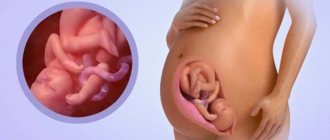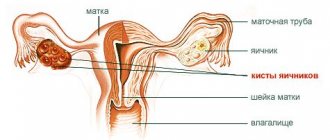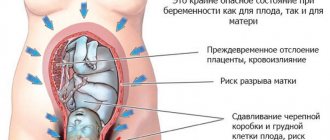Why does my stomach hurt at 16 weeks of pregnancy?
Week 16 – the initial stage of the second trimester.
The process of physiological changes in the body of the expectant mother continues. At this time the following happens:
- Stretching of the muscles near the uterus.
- Enlargement of the reproductive organ.
- Stretching of surrounding tissues.
- Tension of the supporting ligaments will increase.
- Constant tension in the muscles of the anterior abdominal wall (due to increased tension and pressure, tingling may be felt).
A woman may experience pain and unpleasant discomfort in the lower abdomen. In the absence of additional symptoms, this condition can be called normal.
If there are malfunctions in the gastrointestinal tract, increased gas formation occurs in the intestines. The patient is prescribed a special diet. Prescribe a diet in fractional portions.
Carbonated drinks, hot spices, fatty and fried foods are prohibited. To restore metabolic processes and maintain health, it is good to take short walks.
If a woman has recently undergone abdominal surgery, then physical suffering is associated with stretching of surgical sutures due to an increase in the size of the uterus.
Additional signs of dangerous conditions (threat of miscarriage, placental abruption, frozen pregnancy, infectious pathologies of the urinary tract):
- the nature of the pain is nagging;
- elevated temperature;
- will be accompanied by vomiting;
- discharge mixed with blood and a strong odor;
- frequent urge to urinate and a burning sensation when emptying the bladder;
- change in skin color.
You cannot delay contacting a doctor. While carrying a child, a girl must understand and accept the degree of responsibility. The birth of a healthy baby is a process that lasts all 40 weeks.
Incorrect treatment and uncontrolled use of pharmaceuticals will lead to complications. And this causes developmental disorders in the child and even threatens death.
The doctor will select the appropriate diagnostic methods and course of treatment. Draw up a rehabilitation plan. Will give the necessary clinical recommendations to minimize discomfort.
Pain treatment
An important detail that every expectant mother should remember: when the lower abdomen hurts at 17 weeks of pregnancy, treatment is prescribed exclusively by a doctor only after the cause of the pain has been established:
- If we are talking about a disease of the genitourinary system, for example, cystitis, medications for this disease are prescribed, taking into account the individual characteristics of the pregnant woman.
- If the cause is an intestinal or stomach disease, it is necessary to begin treating constipation. For example, you may be prescribed Duphalac; you also need to drink more water and normalize your diet. The doctor can create a diet for a pregnant woman that normalizes the bowel movement process. The diet should include a lot of fruits and vegetables, as well as cereals, soups, and dairy products.
- If we are talking about intestinal bloating, you can take Espumisan; it has no contraindications during pregnancy.
- When it comes to the risk of miscarriage or placental abruption, it is necessary to urgently hospitalize the pregnant woman and begin treatment in a hospital setting.
What causes nagging, aching pain during pregnancy?
Pulling occurs due to enlargement of the uterus, stretching of the surrounding muscles, ligaments, tissues, and skin. Aching is associated with weight gain.
There is a constant increased load on the spine, ligaments, and muscles. The musculoskeletal system is constantly tense. Reaction to neighboring parts of the body is likely.
The described species are considered safe for obstetrics. They do not pose a threat to mother and fetus. Dangerous ones are accompanied by additional symptoms that require urgent medical attention.
Sounds of nature for stomach pain
Sound therapy - listening to recordings of the sounds of forests, open bodies of water, wind, thunderstorms, rain, and natural phenomena. City dwellers are deprived of the opportunity to unite with nature. The positive effect was noticed long ago and was used in oriental medicine.
When listening, a woman will be able to relax. Feel peace, harmony, high spirits, good spirits.
This does not have an independent therapeutic effect like analgesics, but improving morale has a beneficial effect on minimizing pain.
What does dull, pulling, point or cutting pain in the abdomen indicate?
Stomach pain during pregnancy is due to changes in the body, in organs associated with hormonal changes, changes in the position of internal organs, and obstetric pathologies.
Many types of these sensations do not pose a threat to the health of the mother or the condition of the fetus. Others cause significant harm and even death to the woman and the unborn child.
Pain is a reaction of the nervous system to stimuli. A symptom of many diseases, including obstetric pathologies during pregnancy. A pregnant woman experiences hormonal changes and a restructuring of many systems. They are also accompanied by this feeling.
If discomfort and pain occur, it is better to consult with your doctor about the nature of these sensations and appropriate treatment. During pregnancy, a woman is responsible not only for her own health, but also for the health of the baby.
Nature has determined that the mother’s body tries to protect the fetus from all negative influences. A plug formed from mucus in the cervix prevents pathogenic microorganisms from entering.
Umbilical cord nutrition is formed in such a way that harmful chemical compounds do not enter the fetus. The uterus itself protects the child from external mechanical influence.
At the same time, during the period of bearing a baby, the woman herself may regularly experience pain of varying intensity and nature. Each type of discomfort indicates the presence of different pathological conditions, with the exception of harmless obstetric ones associated with changes in the maternal body and preparation for childbirth.
Based on the nature, intensity of pain, and gestational age, we can talk about how dangerous the condition is.
For example, pulling, extending to the lower back and groin, may indicate a risk of miscarriage. An additional sign of the condition will be the presence of bloody discharge.
In this case, you should immediately seek medical help and undergo an examination. If you delay visiting a doctor, the frequency of contractions will become more frequent and spontaneous miscarriage will occur.
Uterine tone is dangerous regardless of how early it was diagnosed. The fetus may experience a lack of oxygen and incoming nutrients. The woman feels a sharp pain like contractions. The solid state of the uterus and lower abdomen is recorded.
In case of injury, late toxicosis, or stress, placental abruption may occur. The condition is accompanied by acute pain in the lower abdomen. Often there is internal bleeding without external manifestations in the form of discharge. Urgent hospitalization and surgical intervention are required. Without help, death will occur.
Cramps accompanied by dizziness at five to twelve weeks can be a symptom of an ectopic pregnancy. For a number of reasons, the egg was unable to enter the uterus and became embedded in the fallopian tube.
As a result of the rapid growth rate of the fertilized egg, severe pain occurs. The woman is sent for an ultrasound examination. An operation to terminate the pregnancy is prescribed. Lack of medical care will result in death for the pregnant woman.
A number of non-gynecological problems also contribute to the occurrence of unpleasant sensations in the lower abdomen:
- Disruption of the gastrointestinal tract. Additional symptoms: bitterness in the mouth, tingling in the lower abdomen, heartburn.
- Inflammation of the bladder and urinary tract. Symptoms: discomfort and burning when urinating, increased frequency of the urge to urinate, increased body temperature.
- Seasonal colds. They are accompanied by headaches, nasopharyngeal congestion, aching bones, and fever.
- Inflammation of the appendix (appendicitis). An acute condition in which severe vomiting occurs, weakness, and a strong increase in temperature are detected. Surgery is used to remove the inflamed area. This procedure is safe for a pregnant woman. Abdominal laparotomy appendectomy is used if peritonitis is suspected and less invasive laparoscopy is used if there are no signs of peritonitis. A course of rehabilitation therapy is prescribed.
It is possible to diagnose the pathology based on additional symptoms. Treatment should be supervised by medical professionals. It is prohibited to take pharmaceutical drugs on your own. If you aggravate your own condition through inept actions, this will inevitably affect the child’s development.
Medical research
If a woman notices that her lower abdomen is aching during 17 weeks of pregnancy, the doctor will prescribe a series of tests and studies. When it comes to the threat of a frozen pregnancy, unscheduled screening is prescribed; in the second trimester it is carried out as planned, so there may be no need for additional screening. It is this study that will show the baby’s activity and condition.
Urine and blood tests are also taken, and hormone tests are prescribed. All this shows the condition of the baby and the expectant mother. In addition, blood pressure, abdominal volume, uterine fundus height, mother's weight, and baby's heart rate are measured.
In addition to all of the above, an ultrasound may be prescribed at the 17th week of pregnancy. It will show deviations in the development of the child, identify a frozen pregnancy, if any, and also allow you to see fetal abnormalities. These important studies, combined with data on the condition of the pregnant woman, will help diagnose the disease or abnormality, if any. A correct diagnosis will reduce the likelihood of complications, as effective treatment will be carried out.
When do you need to see a doctor urgently, and which doctor will help?
Cases of pain where medical intervention cannot be avoided:
- Cramping attacks of a pulling nature (especially in the first trimester of pregnancy) - you need to immediately seek help. There is a high risk of miscarriage or placental abruption. The presence of mucous discharge mixed with blood is a reason to call an ambulance for immediate hospitalization of the patient.
- Shingles with a return to the lower back in the presence of a burning sensation at the time of urination - signs of the development of pyelonephritis. Long-term treatment may be required. Signs of illness should be reported immediately.
- In the later stages, accompanied by contractions and increased uterine tone - a sign of premature birth.
Regardless of the stage of pregnancy, the appearance of bleeding from the vagina with or without pain - you should definitely call an ambulance.
Consulting a pregnant woman and caring for the patient during pregnancy is the responsibility of the local obstetrician-gynecologist. They work in district antenatal clinics.
You can get an appointment with them in the following ways:
- through an electronic appointment system;
- by calling the registration number of the medical institution;
- Some consultations retained the journal recording system.
If the pain is not associated with the course of pregnancy and does not affect the development of the fetus, then you need to contact your local physician. It is important that treatment is selected taking into account saving the life and health of the mother and child.
Discharge
Previously, we noted that when at the 17th week of pregnancy the lower abdomen stretches slightly, this is normal. If the pain is severe and accompanied by discharge, this is a reason to consult a doctor. In general, it is the discharge that will help a specialist determine the condition of a pregnant woman and the presence of abnormalities.
If nagging pain is accompanied by bloody vaginal discharge, this may indicate a threat of miscarriage. In this case, the woman is often hospitalized and observed in a medical setting. You should not panic right away, since discharge of this kind may also indicate stretching of the uterus, which is normal. Only a doctor can evaluate and make the correct diagnosis after examination.
If a woman experiences gray, yellow, greenish discharge, which is heterogeneous, or curdled discharge, then this is a reason to immediately consult a doctor. It is such discharge that indicates a possible infection of a pregnant woman with sexually transmitted infections; most often, women are diagnosed with thrush.
Top medications to reduce abdominal pain during pregnancy and breastfeeding, painkillers
Painkillers are not advisable during pregnancy. Especially in the first months, when the main formation of organs and tissues of the future person occurs. However, the process of experiencing discomfort caused by constant negative factors also does not bode well.
Before purchasing analgesics, consultation with a specialist is required. It is advisable to try non-pharmaceutical ways to cope with discomfort.
The least dangerous drug is Paracetamol. Suitable for use throughout the entire gestation period. Toxic components are in minimal concentration and are quickly excreted in the urine.
Ibuprofen is a non-steroidal anti-inflammatory drug. Prescribed with caution during the second trimester. Contraindicated for the first and third trimester. Use may cause a number of dangerous side effects. If your condition changes slightly for the worse while taking an analgesic, you should inform your doctor.
Indomethacin also belongs to the group of non-steroidal anti-inflammatory drugs. It is subject to the same restrictions as Ibuprofen. If taken continuously, there is a risk of damage to the child's kidney function.
For the first two trimesters, it is permissible to use creams and ointments based on:
- Diclofenac.
- Ketoprofen.
- Ketorolac.
In the third trimester, you can only use local products based on herbal ingredients. It is forbidden to apply them if they contain bee or snake venom.
Ointments with an irritating effect that stimulate increased blood circulation can also have a negative effect. There is a risk of developing uterine tone and high blood pressure.
The most powerful painkillers are classified as narcotic substances and are prohibited for free sale. Their use occurs only in a hospital with extremely severe pain. These are drugs based on morphine and codeine.
The list of chemical compounds for pharmaceutical use during pregnancy is extremely limited. Before you start taking it, you should read the instructions for use in detail and strictly follow the manufacturer’s recommendations on dosage and method of use.
It is important to familiarize yourself with the provisions on common side effects and contraindications.
It is possible to use folk and non-traditional methods of getting rid of suffering. For example, yoga for pregnant women, acupuncture, light massage, aromatherapy. Traditional methods are also used. But their use also needs to be discussed with a specialist.
Recommendations
In order to reduce painful discomfort in the lower abdominal cavity, the following recommendations should be followed:
- Dietary nutrition should ensure the functioning of the digestive system. Vegetables, fruits and nuts are required for intestinal motility to work. Fermented milk products provide proper peristalsis and enzymes for processing food masses, preventing the occurrence of colic.
- Sufficient fluid intake helps maintain the desired water balance. You need to know that the lack and limitation of drinking liquid provokes storage processes inside the body and further swelling. Fats, carcinogens, coffee, flour and sweets should be limited.
- Moderate physical stress, gymnastics and exercises to stretch the muscles of the perineum and ligaments. Pregnancy is considered a normal physiological state for the female body. Therefore, an average load will be necessary. Exercises that help prepare the body for childbirth include stretching, bending, etc.: kneel down, place them shoulder-width apart and sit down. This pose helps stretch the perineal ligaments. When your health allows, you can gently lie on your back (“fish”). Sitting on the floor, you need to bend your knees and press them towards you with your heels. The heels themselves rest against each other, and the knees drop to the floor. It's called a "butterfly".
- Relaxing and squeezing the muscles of the perineum helps if you are 16 weeks pregnant and experience muscle pain. The following exercise helps control the perineum. They perform it as if there is a desire to go to the toilet and you need to restrain yourself. At this time, the muscles of the perineum tense. You need to maintain tension for 10 seconds and relax the perineum. This exercise will be especially important when preparing for childbirth.
- Walking and accessible walking activities help stimulate blood circulation and increase the supply of oxygen to the internal organs of the pregnant woman and the placenta. At this time, there is an accelerated elimination of toxic substances. It is known that the most painful sprains occur in inactive women who lead a passive lifestyle. To prevent this condition, if your leg muscles hurt, walking should be done every day.
- Prevent negative emotions. It is necessary to reduce or eliminate psychological complexes. The human body is considered an integral structure that consists of physical matter and information.
Various emotions and thoughts are reflected in bodily sensations.
Anxiety, anger, disappointment, irritability, anger and envy provoke spasms, compression of the muscles of the internal organs of the limbs, face and, during pregnancy 16 weeks, pelvic and abdominal muscles.
Compression and strain of the muscles in the lower abdominal cavity compresses the blood vessels that supply the fetus with nutrition and oxygen.
Due to maternal emotions, the child may receive a physiological shock as prolonged hypoxia.
When a woman’s stomach (bottom) feels tight at 16 weeks of pregnancy, you shouldn’t immediately panic.
It is necessary to consult with a specialist, undergo the necessary examination and pass the required tests.
You should not delay therapy or visiting a specialist, since at this stage the health of her child depends on the pregnant woman.
Preventive measures to avoid abdominal pain
The basis of prevention is the correct lifestyle of a pregnant woman:
- No stress factors. The mental state of the mother is the key to the health of the child. The fetus inside a woman reacts sensitively to changes in the mother’s emotional background. He is not able to recognize the causes of depression or fears, but he is aware that adverse events are occurring. If the mother is very worried, there is a risk of pathological changes during the formation of the future person. Neurological and psychological problems are possible.
- Elimination of physical fatigue. Pregnant women are not recommended to attend training regularly. During active sports, blood pressure levels increase noticeably. This will provoke the development of uterine tone, which will inevitably lead to adverse consequences. You can go for walks in the fresh air.
- Properly designed diet and nutrition schedule. It must be balanced. You should not consume fast food products or preservatives; it is recommended to reduce the amount of tea and coffee. It should consist of vegetables, fruits, animal and plant protein. It is worth taking vitamins prescribed by a doctor for those who are pregnant. Weight control is required, since the percentage of subcutaneous fat outside the normal range negatively affects the functioning of the cardiovascular system and gastrointestinal tract. The feeding processes of the fetus are disrupted. With rapid weight gain, nutritional correction and a special diet may be prescribed. Excess weight contributes to decreased activity, bad mood, and additional pain in the back and joints. Make sure there is no overeating.
- Maintaining a sleep and rest schedule ensures that a woman is highly active. She does not feel tired and overwhelmed, which means she has a positive morale.
- Regular observation by an obstetrician-gynecologist according to the established schedule, passing mandatory tests, compliance with received medical recommendations. Undergoing developmental ultrasound examinations and other diagnostic measures.
- Tracking the development of chronic pathologies that were diagnosed before pregnancy.
- Prompt treatment of colds, bacterial and viral diseases acquired during pregnancy.
- Eliminate all bad habits, such as alcohol, smoking, and drug use. Failure to comply with this rule results in a developmental delay in the baby.
- Monitoring blood pressure for hypertension (high blood pressure) or hypotension (low blood pressure). Monitor your sugar levels if you are diagnosed with diabetes.
- Do not take a hot bath or shower, or a contrast shower. A sharp change in ambient temperature threatens a rise in pressure and disruption of the cardiovascular system.
Compliance with these rules will ensure comfortable and proper pregnancy. The pain will be considered obstetrically safe. But even if you follow all the recommendations, you need to carefully monitor your own condition and, if there are reasons, seek medical help.
Ultrasound photo of the child
The sixteenth week of pregnancy passes in a cheerful state for the expectant mother. And you may have felt your baby move for the first time. Over these weeks, you and your baby have undergone many changes, and there is still a lot of time ahead until your baby gets stronger and decides to be born.
What does sudden abdominal pain mean?
The suddenness of the development of pain is a sign of an acute form of pathology. If the sensation is localized on the right side, accompanied by nausea, vomiting, dizziness, there is a risk of developing inflammation of the appendix.
Immediate hospitalization and surgical intervention are required before perforation begins. Removing appendicitis is a common procedure for surgeons. It passes without complications.
During pregnancy, the operation is performed in compliance with all required patient safety criteria.
Non-obstetric types of pathological pain of a sudden acute nature include:
- intestinal obstruction;
- peritonitis.
As with appendicitis, acute pain accompanied by vomiting and general weakness. The syndrome extends to the lower abdomen, lower back, sacrum, and groin.
Unilateral, accompanied by bleeding from the vagina - a sign of ectopic pregnancy.
Additional signs of a dangerous condition:
- cramping character;
- increased symptoms in a horizontal position of the body;
- severe vomiting;
- shortness of breath at rest;
- frequent heartbeat, which in frequency goes above 100 beats per minute.
In the absence of medical attention, the fallopian tube ruptures. Internal bleeding begins.








